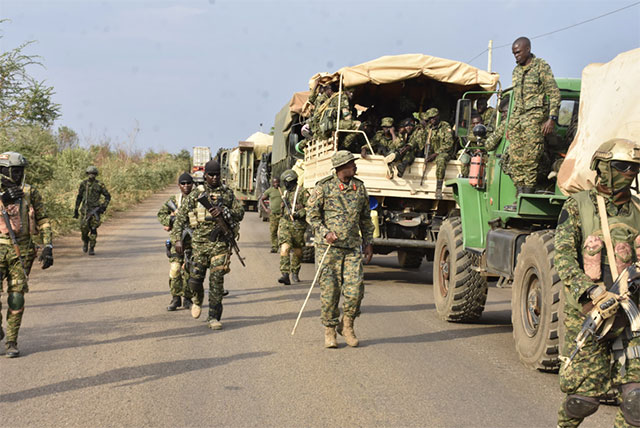The Uganda People’s Defence Forces (UPDF) is facing accusations of using chemical weapons in South Sudan, but the military has strongly denied these claims. Reports circulating on social media allege that Ugandan Air Force jets dropped chemical and barrel bombs on rebel White Army positions in Upper Nile and Jonglei states.
However, the UPDF has dismissed these allegations as “false and misleading,” calling them a propaganda campaign orchestrated by South Sudanese opposition leader Dr. Riek Machar and his allies.
UPDF: “We Do Not Possess Chemical Weapons”
In a press statement released on Friday, Acting Defence Spokesperson Col. Chris Magezi refuted the allegations:
“The UPDF neither possesses chemical weapons and barrel bombs nor operates systems designed to deliver them. Great care is always taken to avoid attacking civilians or civilian objects.”
Magezi further claimed that the reports were part of an AI-generated disinformation campaign aimed at undermining Uganda’s military presence in South Sudan. He urged the public to “ignore the naysayers” and reiterated that UPDF operations are conducted with “professionalism and precision.”
He also emphasised that Uganda’s military intervention in South Sudan is fully authorized by the government in Juba.
At present, no verified evidence has been presented to confirm the use of chemical weapons by the UPDF. The accusations originate mainly from social media accounts allegedly associated with South Sudanese opposition groups.
While the UPDF maintains its innocence, the allegations have sparked concern among opposition lawmakers, who are demanding greater transparency regarding Uganda’s military engagements in South Sudan.
Kiira Municipality MP Ibrahim Ssemujju Nganda criticized the government for withholding information from Parliament and the public.
“Our army is engaged in two wars—one in DRC and another in South Sudan—yet Parliament remains uninformed. Even more disturbing are reports that Uganda used chemical weapons,” he said.
Ssemujju also pointed out contradictions in the government’s statements. Just weeks ago, Defence Minister Jacob Oboth-Oboth denied knowledge of any UPDF deployment in South Sudan, even as UPDF Chief Gen. Muhoozi Kainerugaba publicly announced the arrival of Ugandan commandos in Juba.
Uganda’s involvement in South Sudan is not new. The country has long viewed its northern neighbour as a strategic partner, both economically and in terms of security. South Sudan is a key market for Ugandan exports, and Uganda hosts over 1.5 million South Sudanese refugees, making regional stability a priority.
The latest military deployment—initiated nearly two weeks ago—aims to reinforce the government of President Salva Kiir amid growing internal conflict. Supporters argue that Uganda’s presence is necessary to preserve stability, while critics claim it is primarily about protecting its economic and political interests.
Despite the controversy, Uganda’s Parliament has strengthened its commitment to the mission by approving an additional Shs 39.1 billion in funding for the UPDF’s operations in South Sudan. Speaker Anita Among fast-tracked the approval process, citing the urgency of the matter.
“I will not allow extensive debate on this matter… Diplomacy and security issues are highly sensitive,” she stated before the vote passed at 5:40 PM on Thursday.
Defence Minister Jacob Oboth Oboth defended the deployment, stating that it is legally grounded in Uganda’s Constitution, the UPDF Act, and a 2014 defence cooperation agreement with South Sudan. He also warned that failure to act could have “severe repercussions for Uganda’s security and economy.”
The renewed fighting in South Sudan has further strained the fragile 2018 power-sharing agreement between Kiir and Machar. In response to the escalating violence, the Intergovernmental Authority on Development (IGAD) convened an emergency summit, urging both sides to de-escalate tensions.
“The people of South Sudan deserve lasting stability, not a return to conflict. IGAD reaffirms its commitment to the full implementation of the R-ARCSS and urges all stakeholders to act responsibly in the interest of peace and national unity.” IGAD stated in a press release.
As of now, there is no verified evidence to support the allegations that Uganda has used chemical weapons in South Sudan. The UPDF categorically denies these claims, insisting that its operations are conducted precisely and professionally. However, opposition figures and civil society groups continue to demand greater transparency about Uganda’s military engagements in the region.


